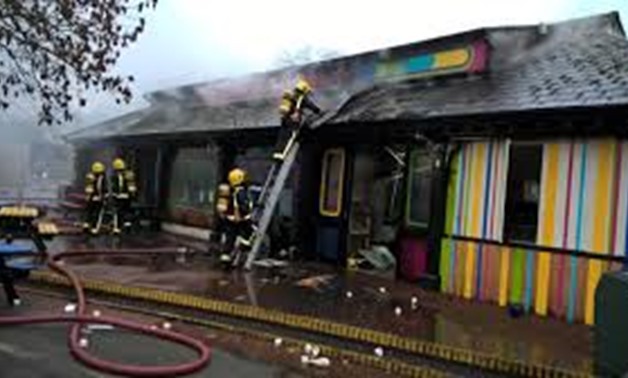
Firefighters are seen tackling a blaze at London Zoo following a fire which broke out at a shop and cafe at the attraction, in this photograph received from London Fire Brigade, in central London, Britain December 23, 2017. London Fire Brigade/Handout via
LONDON– 23 December 2017: An aardvark was killed and four meerkats are missing after a blaze tore through part of London Zoo early on Saturday, shutting the British capital’s popular tourist attraction until further notice as staff assess the damage.
The fire broke out shortly after 0600 GMT at the zoo’s Animal Adventure section before spreading to an adjacent gift shop and cafe, near to an area where visitors can handle and feed animals, the zoo and London Fire Brigade said.
More than 70 firefighters took three hours to bring the fire under control while desperate keepers who live on the site in Regent’s Park in central London moved animals to safety. Some of the staff needed treatment for smoke inhalation and shock.
Ten-year-old Misha the aardvark, one of the attraction’s best-loved animals, perished in the fire and four of the meerkats were unaccounted for, said Dominic Jermey, the zoo’s Director General.
“We’re absolutely devastated that Misha the aardvark has been killed and we’re still trying to find out what happened to the meerkats, but at the moment the site where this fire took place is closed down,” he told BBC TV.
“At the moment we’re not certain what has happened to the meerkats but I‘m not optimistic at this stage, unfortunately.”
He said no other animals had been affected.
The attraction, the world’s oldest scientific zoo which dates its origins back to 1826, houses 20,166 animals, according to its inventory for 2017.
The fire brigade said it had sent 10 fire engines and 72 firefighters to the scene and added that the cause of the blaze was under investigation.
“The fire mainly involved the cafe and shop but part of a nearby animal petting area was also affected,” said Station Manager David George.
“When they arrived our crews were faced with a very well developed fire. They worked incredibly hard in arduous conditions to bring it under control as quickly as possible and to stop it from spreading to neighboring animal enclosures.”

Comments
Leave a Comment